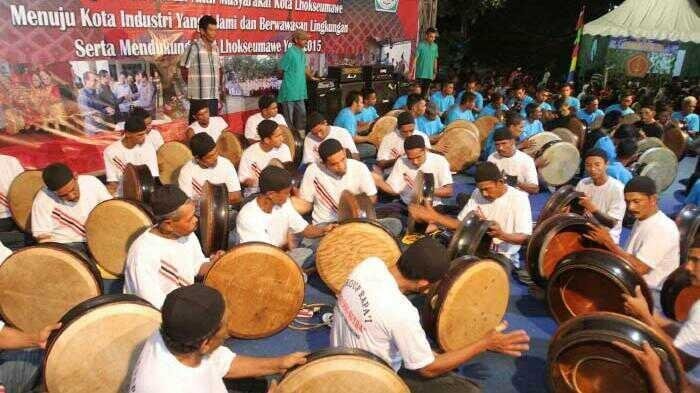
The traditional percussion instruments that are included in the family drum, played with the way was hit with the hand without the use of a cane. Rapai looks at a time when the traditional ceremony in Aceh like the wedding ceremony, circumcision, the night market, accompany dance, birthdays, anniversaries and so on, and is the part that is inseparable from the life of the people of Aceh well Philosophically or culturally. Rapai produces rhythmic tempo, Tingkahan, Jingle, and create the atmosphere becomes more lively and lively. A tool that supports Chorus (melody) of Kalee Serune or NE Sungei Buloh (berinterval pneumatic melodies diatonic sounds).
There is a slogan often heard contains "Peunajoh Timphan, Piasan rapai " that there is no typical food of the population of Aceh is a timpan (a sort of cake from rice flour contains coconut and palm sugar , or contain Salazar/ASO rich egg, wrapped in young and steamed in banana leaves), then Piasan Rapai music that entertainment is Rapai.
Based on a handwritten poem sung with Rapai music Tap comes from Sheikh Abdul Kadir Jailani, the great scholar of the jurisprudence of Persia who lived in Baghdad from 1077 to the year 1166 CE (470-560 CE). The verse that mentions (in Indonesia language):
In the sky high Star Propagation candle light Kebumi origin of the radiant tank of Rapai Sheikh Abdul Kadir Inilan the legitimate creators born Kebumi.
Rapai carried by a broadcaster of Islam from Baghdad named Sheikh Neat (some call Thierry Davis Rifai) and can be consulted for the first time in Banda Aceh, the capital of the Kingdom of Khalifak (today Gampong Pandee, Banda Aceh) around the 11th Century.
Rapai played in the ensemble composed of 8 to 12 players called and juxtaposed with other instruments such as serune or Sungei Buloh ne kalee. The game of the Rapai set can be reprogrammed from a distance because of the echo that the search and no microphone for each show was even the day in the rural areas could reach the audience from a distance of 5-10 km.